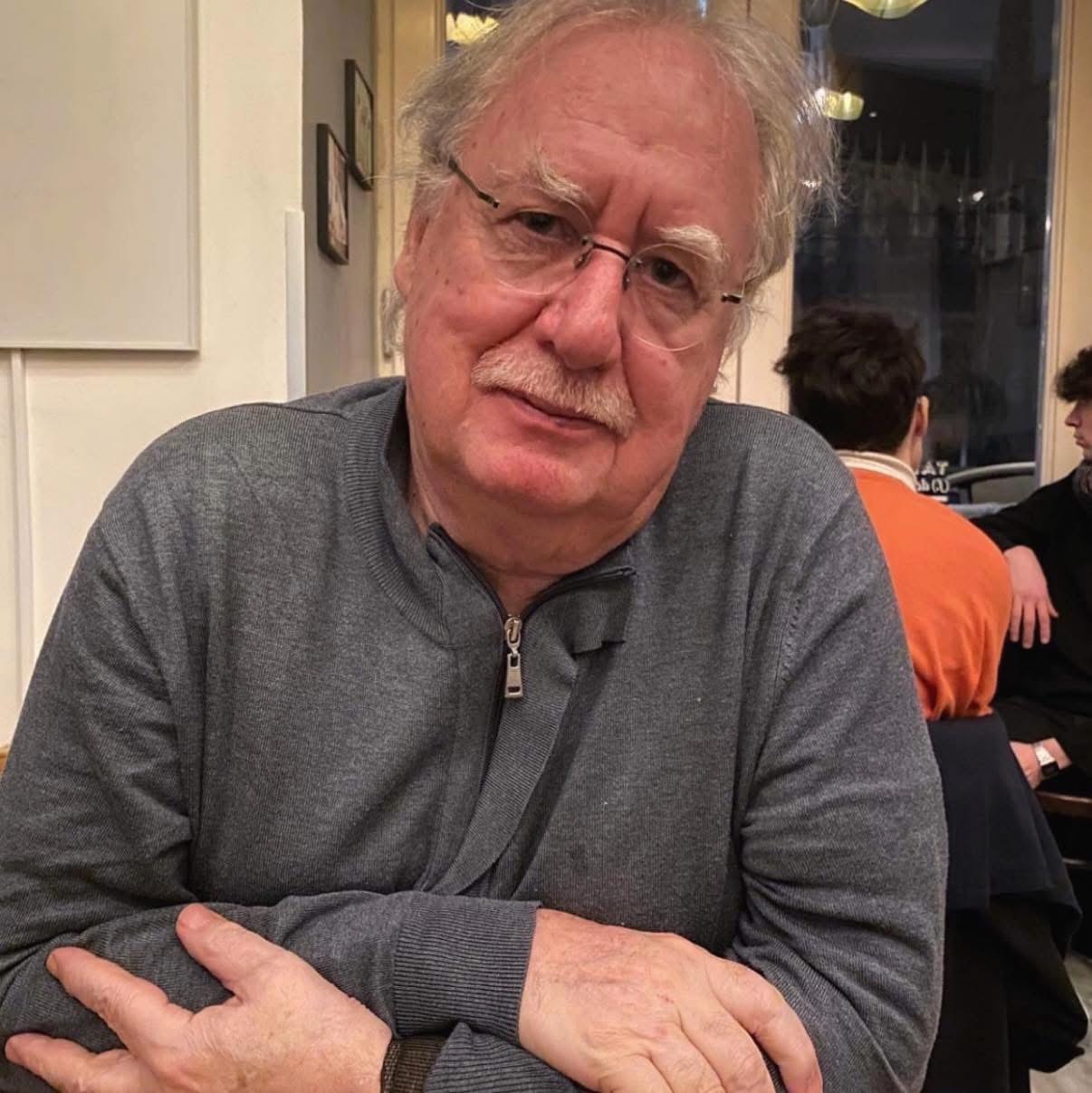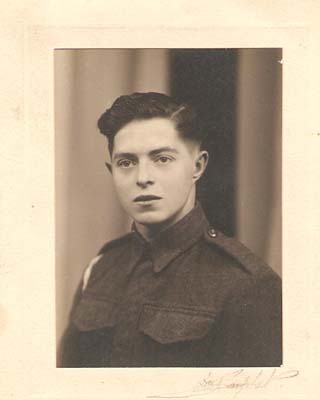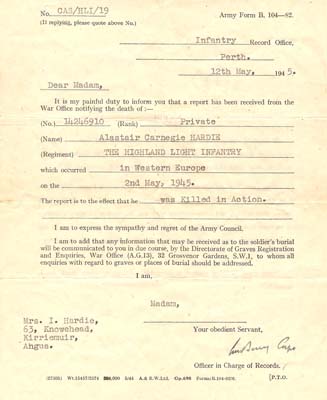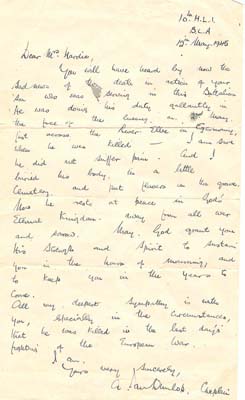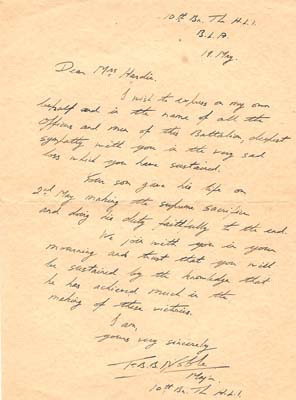This is about my uncle Alastair Hardie from Kirriemuir in Scotland. In many ways his story is not an exceptional one. But I write it as a tribute to him after whom I was named – I was the first male child to be born in the family after his death and fate had it that I lived with my grandparents (his parents) for 10 years in the 1960s. Whilst his war was not that different to thousands of other servicemen it is the fact that he was killed on the last day of action in the war by his company of the 10th Battalion of the Highland Light Infantry (HLI) together with the timing of his family being told of his death which coincided with the announcement of the end of the war that caused such an emotional impact which makes the telling so compelling.
Well let’s start at the beginning………….
He was born Alastair Carnegie Hardie on 13 August 1923 in the small village of Friockheim in what is now Angus but was then Forfarshire in Scotland. He was the only son in family of six children of Harry and Bella Hardie. They had had four daughters by the time he was born and were starting to think they would never have a boy. When he was still a young child the family moved to Kirriemuir – a small town in the centre of the county – the birthplace of the author Sir J M Barrie famed as the creator of Peter Pan.
Alastair grew up in Kirrie (as Kirriemuir is always known) in a loving but essentially poor family – his father was a labourer who worked on local building projects. The family lived in a relatively large four bedroomed local authority house at 63 Knowehead standing on the corner of a small cul-de-sac on the outskirts of the town.
After leaving school he worked at the local Co-operative Society as a butcher making plans to set up his own butcher’s shop with his best friend David Reid.
He was called up to fight in the 2nd World War in 1942 – he was 19 years old. He joined the Royal Artillery and for his first two years his skills as a butcher were used by his regiment as he worked as a cook/butcher. However in the run-up to D Day he was with The Queen’s Own Royal West Kents based in Hastings. He landed in Normandy on 8 June 1944 – two days after the invasion began. He fought as a gunner right through the campaign in Northern France until he returned to the UK in December 1944 where he undertook an intensive course of infantry training and was then transferred to the 10th Battalion of the Highland Light Infantry. He had his last leave at home in Kirrie in February 1945 before returning to the battlefields of Europe. He was landed in Belgium in early March 1945 as part of 101 Reinforcement Group ready for the final assault on Germany itself.
His letters to his mother back home in Kirrie tell the story of the final days of the war – they make for poignant reading. On Sunday 25 March 1945 he writes ‘we are sleeping under canvas in a big wood just inside Germany’. He went on ‘I hear we have crossed the Rhine we heard the guns firing in the distance. It won’t be long now before the war is finished. Well ma there is no need to worry they may never need us in the front line’. He wrote again on 26 April 1945 saying ‘there is nothing much doing at the present moment’ he added that ‘I had my picture taken by a cameraman. I was sitting on top of a tank at the time, so you may be seeing me on the news sometime’.
The war in Europe ended on 8 May 1945 when the German High Command surrendered with Hitler dead as the Russian army marched into the centre of Berlin. Harry and Bella Hardie listened to Winston Churchill’s broadcast on the radio declaring the end of the war. They went out celebrating with friends and like their neighbours placed Union Jack Flags in the front garden of their house. They began to look forward to Alastair returning home and to the family getting back to normal life.
But on the morning of 13 May Harry Hardie was on his way to work. He was walking down Tannage Brae, a steep incline about half a mile from the family home, when he came across the local post woman who the moment she saw him began to cry. She handed him a brown envelope and told him to go home immediately. Harry saw that the envelope was marked as from the War Office. He did not open it but turned on his heels and ran back up the brae to home. Bella saw him from the kitchen window and ran down the garden path towards him – she saw the envelope in his hand and knew what it was before he handed it to her. Harry thrust the letter into her hand and just said ‘It’s about your laddie’. Harry went straight to his bedroom and Bella returned to the kitchen – there was nobody else in the house and she slowly opened the envelope. The contents read ‘Dear Madam, It is my painful duty to inform you that a report has been received from the War Office notifying the death of: 14246910 Private Alastair Carnegie Hardie of the Highland Light Infantry in Western Europe on the 2nd May 1945. The report is to the effect that he was Killed in Action.’ Bella could not remember anything that happened for the rest of the day or indeed the following day. Her daughters began returning during the day and read the letter which was lying on the kitchen table. Their mother was inconsolable and their father was locked in his bedroom.
Eventually the curtains in the house were drawn and their daughter Alice took down the flags from the garden. She told the neighbours that Alastair had been killed and the news soon spread around the small town of Kirriemuir. There was a general and heartfelt sadness right around the town.
But one member of the Hardie family had a reason to feel a very particular sadness at her brother’s death and that was my mother Connie because 2 May 1945 was her 17th birthday.
But there was more poignancy to come. A few days after they had been informed of Alastair’s death they received a letter from him. Although it is not entirely certain it does seem that he wrote it on the day he was killed - the censor had torn away the top right hand corner of the first page of the letter where Alastair will have written his address and the date. But the envelope is date stamped 3 May 1945 which would suggest he wrote the letter on or just before 2 May. He wrote ‘well ma I am across the Elbe now – we crossed yesterday. It was not so bad as I thought it would be. I don’t think it can last much longer. To me the Germans seem to be fighting in disorganised groups. We took some prisoners the other day and some of them were no more than sixteen I am sure.’ He ended the letter by saying ‘There is no need to worry – I am in very good health – lots of love Alastair XXX’.
Not surprisingly this letter had a devastating effect on Harry and Bella and their daughters all the more so as the world around them was in celebratory mood. Their lives were absolutely shattered and in the case of Bella although she lived until she was 83 years old - dying in the early 1970s - she never really got over the death of a son who she loved beyond imagining.
The next few weeks brought two more letters which in their way brought the loss of Alastair into sharp relief and gave some context and reality to the circumstances of his death. The first was from the Chaplain of the 10th Battalion of the HLI.
He wrote on 12 May 1945 – ‘Dear Mrs Hardie, You will have heard by now the sad news of the death in action of your son who was serving in this Battalion. He was doing his duty gallantly in the face of the enemy on 2nd May just across the River Elbe in Germany when he was killed. I am sure he did not suffer pain. And I buried his body in a little cemetery and put flowers on his grave.’ He ended his letter by saying ‘All my deepest sympathy is with you, especially in the circumstances that he was killed in the last days fighting of the European War. I am yours very sincerely – David Dunlop – Chaplain.’
This was followed about a week later by a letter from Lieutenant Colonel Noble the Commanding Officer of the 10th Battalion of the HLI. His is a beautifully handwritten and sincere note written while the Battalion was still in Germany – it is worth repeating in full – he wrote ‘Dear Mrs Hardie, I wish to express on my own behalf and in the name of all the Officers and men of this Battalion, deepest sympathy with you in the very sad loss which you have sustained. Your son gave his life on 2nd May making the supreme sacrifice and doing his duty faithfully to the end. We join you in your mourning and trust that you will be sustained by the knowledge that he has achieved much in the making of these victories. Yours very sincerely F B B Noble – 10th Ba. The H.L.I.’
Both these letters gave some solace to the grieving parents and family. They were real and human and written by people who knew their son and who were with him at the end. And interestingly the Chaplain wrote to Bella again in September 1945 following a visit made by a member of the Battalion to 63 Knowehead. He had obviously reported back to the Chaplain that Bella was struggling to come to terms with her loss and was consumed by the thought that Alastair had suffered as he was dying. David Dunlop wrote on 7 September 1945 ‘I should just like you to know that we are thinking of you in your great sorrow and loss. It must be terrible for you to bear it and so difficult to understand it. It is the evil of men that make wars and it is the power of God that alone can sustain us and help us. You must not think that your son suffered. I am quite sure that he did not’
This did much to assuage Bella’s anxieties – she thought that Dunlop was with Alastair as he died so would know whether he had died in pain. But later she received a letter from a Sgt Fyffe of the 10th Battalion which enclosed a letter he had received from Chaplain Dunlop about the death of Alastair Hardie. In this letter to Sgt Fyffe Padre Dunlop gave more details of the death of Alastair. He wrote to Fyffe ‘It was really on our last day of action. I do not know exactly how he was killed – I think it was enemy machine gun bullets but his body was brought from his company to me and I buried him in the little cemetery beside the church at Worth not far from Hohenhorn which is quite near to Hamburg. We marked the grave with a cross and put some flowers on it. I think his grave will be the only soldier’s one in the cemetery. A Pte Stewart of Brechin who knew Pte Hardie and helped to care for his grave will visit his people when he is on leave soon.’
So even more detail which helped in a strange way.
Almost the last twist in the story is that in 1947 as Germany was being reformed and the British Army of the Rhine was becoming more firmly established a letter arrived at 63 Knowehead telling the family that Alastair’s body had been moved from the cemetery at Worth to a British War Graves Cemetery which had been established in the main municipal cemetery at Ohlsdorf in Hamburg. Later that year Bella and her daughter Alice visited Alastair’s grave. It was a traumatic experience for Bella – when she was shown the grave she was convinced that she saw Alastair standing in front of it and made an attempt to embrace him – she became extremely distraught and never returned to Germany.
Her tangible feeling for Alastair never left her. I can recall in the early 1960s coming home at lunchtime from school and finding my grandmother in tears at the kitchen table – she said that she had seen Alastair coming up the brae and had run out down the path to meet him only to find nobody there. He remained in her daily consciousness all of her life – his photograph was always on display in the house and she kept his letters and wallet and hackle by her bed until she died.
He was truly loved and terribly missed. He remains a part of my life – I have his name and I have always been very aware of my connection to him. I have visited his grave in Hamburg on three occasions and each time is more emotional than the last. I hope if it is possible for him to be aware that he senses that he is not forgotten and that his sacrifice on that May evening in 1945 will remain in the memory of the descendants of his parents. And maybe it was my destiny to tell Alastair’s story – I was due to be born on 2 May – my mother’s birthday and the anniversary of Alastair’s death. As things turned out I arrived two days later – but there does seem a strange and uncanny link taking me back to a Scottish soldier who gave his life so late in the war that we all might enjoy the freedom we now take for granted.
Alastair Hardie was a brave soldier who landed in Normandy on 8 June 1944 fought all the way through Europe only to die on the last day of action by the 10th Battalion of the HLI in the Second World War.
He truly nearly made it …………………………..
Photo: Worth, the first churchyard where Alastair was buried on the 2nd May 1945

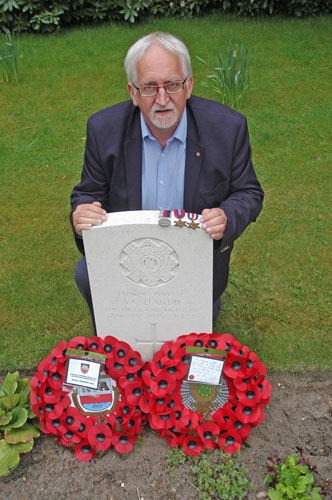
Name: HARDIE, ALASTAIR CARNEGIE
Rank: Private
Service No: 14246910
Date of Death: 02/05/1945
Age: 21
Regiment/Service: Highland Light Infantry (City of Glasgow Regiment), 10th Bn.
Grave Reference: 4A. O. 13.
Cemetery: HAMBURG CEMETERY
Additional Information:
Son of Harry Davidson Hardie and Isabella Carnegie Hardie, of Kirriemuir, Angus.
AD OBE
December 2012

